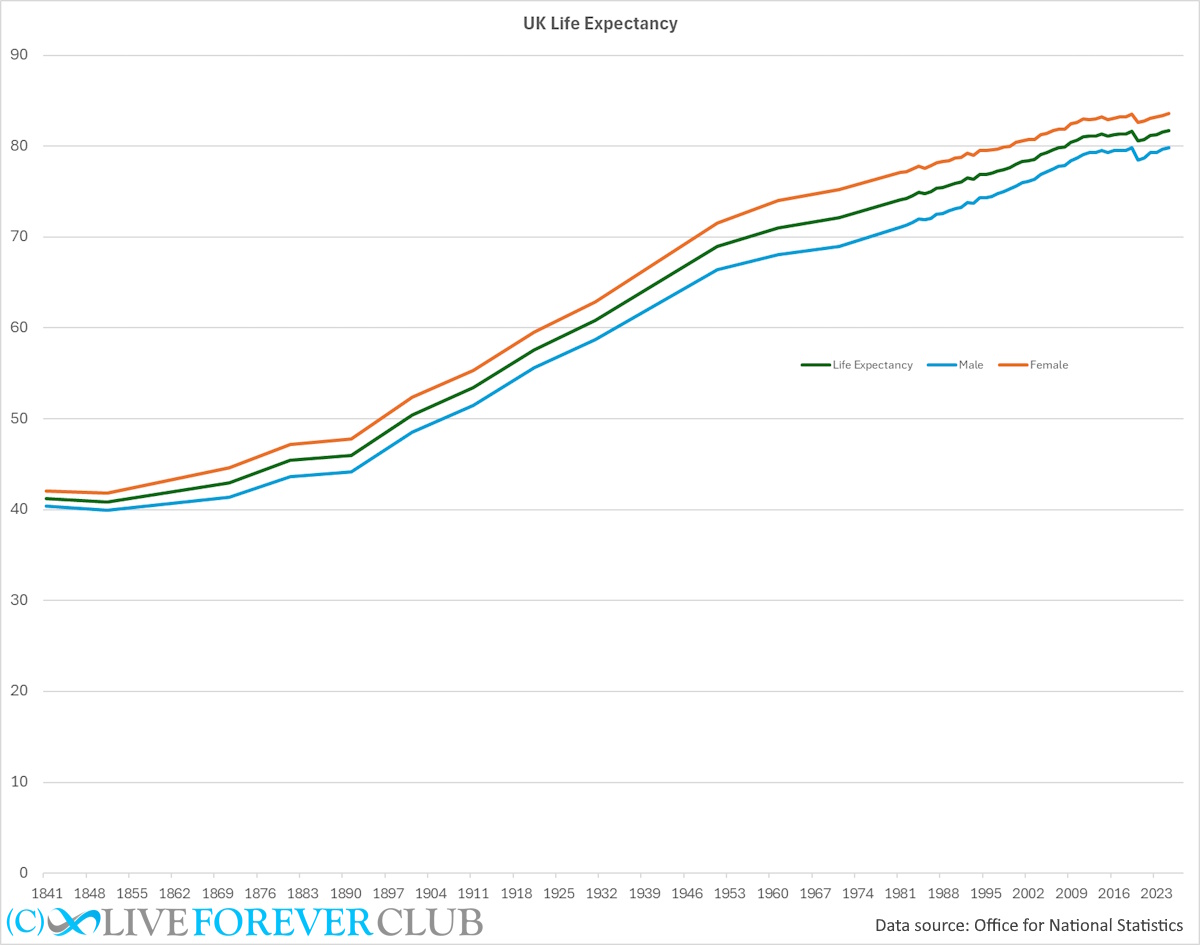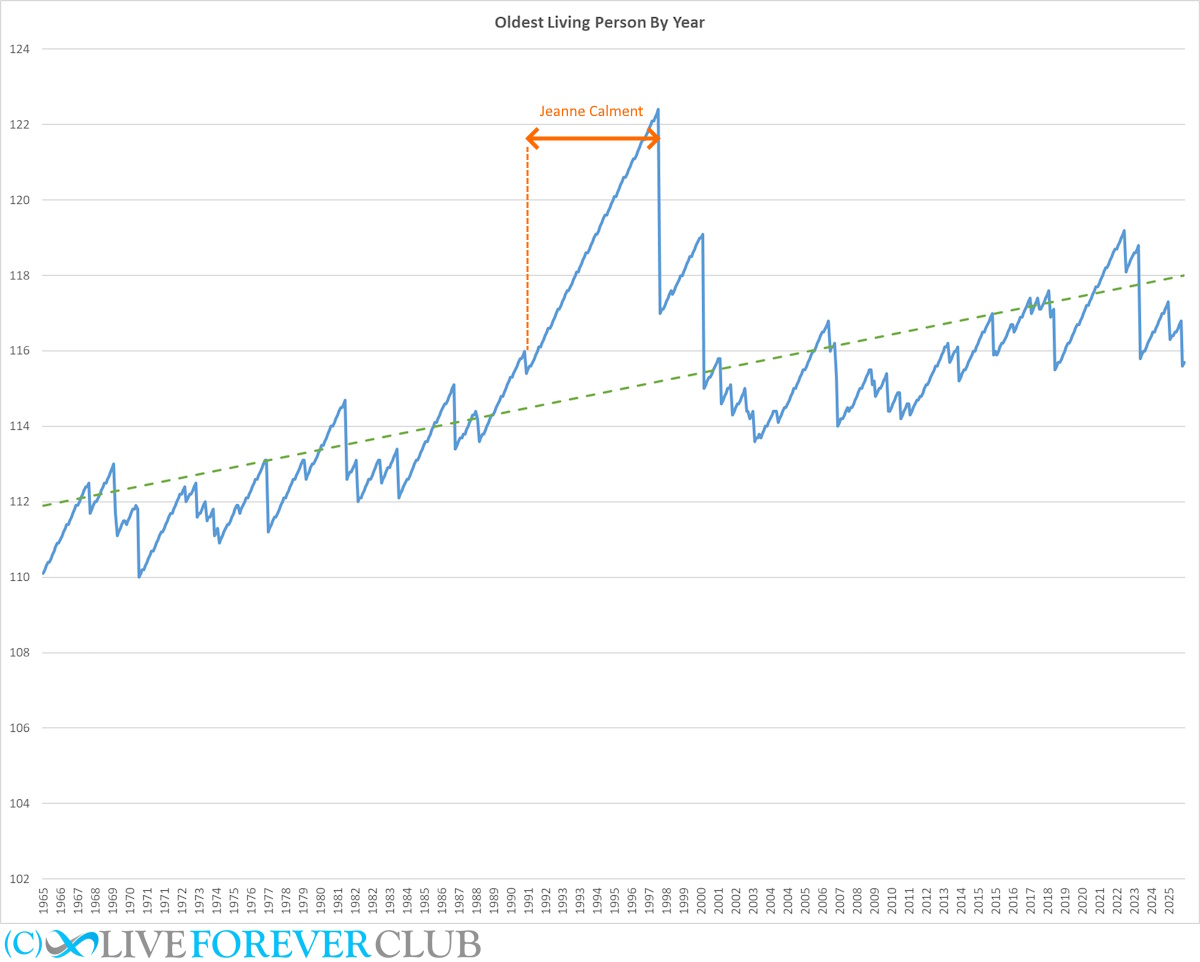Best Longevity Quotes of 2024
Top 5 quotes about life extension and its opposite… death
Join the club for FREE to access the whole archive and other member benefits.
As an advocate of radical life extension, a blow to my optimism (and one highlighted by sceptics) is the obvious lack of any increase in maximum human lifespan since 1997. That record was set by Jeanne Calment, in France, who live to 122 years and 164 days. A record that can’t be broken for at least another 7 years given that the oldest person alive today is a mere 115 – and based on supercentenarian mortality rates plateauing at around 50% there is less than a 1-in-100 chance of that actually happening.
So, has there been no progress if people living longer? Well, yes, on average.
Average lifespan is how long a group of people live, taking into account everyone born and at what age they die. If you’re looking back in time at a specific group of people (e.g. people who have actually died) then that is their mean lifespan. When looking forward in time, this is the group’s life expectancy. For example, we can determine the mean lifespan of people born in the year 1900 as they have all died so we can do the calculation. But looking at everyone born in the year 2000, only a tiny percentage of whom have already died, we have to use statistics to predict their average lifespan.
And average lifespan (aka life expectancy) has definitely been increasing. In 1900 (in England and Wales), life expectancy at birth was 45.6 years (43.7/47.5 male/female). By 2000, this had jumped to 78.0 (75.6/80.4 m/f) – a steady increase of nearly 4 months every year. This dramatic increase in life expectancy was primarily driven by major improvements in public health (e.g. nutrition, vaccinations), medical advances (e.g. antibiotics), and living conditions (e.g. better sanitation, clean drinking water).
Although the increase in life expectancy has slowed, and hit a significant bump with the coronavirus pandemic, this century life expectancy has continued to rise to 80.8 (78.8/82.8 m/f) at a rate of 1.5 months per year.

UK life expectancy by year since 1841
But even if everyone lived to 100, or even 122, that doesn’t mean anyone would necessarily beat Jean Calment’s record maximum lifespan.
Maximum lifespan is simply the longest amount of time someone within a group has lived. Typically, we’re interested in the group of all people who have ever lived – and that is the value that hasn't changed for 28 years. However, we can also look at smaller sets, for example the group of people alive each year, to see it from a different perspective.
The good news is, that when viewed on a month-by-month basis, we can see that the oldest person alive at any time is steadily increasing over time. There is some random variation as well as some statistical outliers such as Jeanne Calment.
In the graph below, I’ve used data from the Gerontology Research Group’s list of supercentenarians as well as the list of oldest people alive today on Wikipedia. It shows the age, within any given year, who was the oldest person alive at the time.

Oldest living person by year
The big peak in the middle shows Jeanne Calment becoming the oldest person alive in 1990, and then in 1991 breaking the record for oldest person ever lived (at the time) which she increased every day until her death at 122 in 1997. Born a month apart, Sarah Knauss (USA) and Marie-Louise Meilleur (Canada) are also outliers generating the 1998/9 peak.
Statisticians can argue over whether these outliers should be included in any analysis, but either way the graph displays a reasonably steady sawtooth increase over time. For simplicity, I’ve included all the data points when calculating the trend line shown in green.
As opposed to a maximum lifespan being unbeaten and unchanged in 30 years, this graph now demonstrates that the oldest living person has been creeping up steadily, if somewhat slowly, for the last 60 years.
In those six decades the oldest person alive, at a particular time, has increased by six years – so a year older every decade. This isn’t radical, nor exponential, but at least it is increasing. Unfortunately, at this rate we won’t expect to see the oldest-person-ever-lived record broken for another 50 years – well beyond the remaining life expectancy of most middle-aged people alive today.
Just extrapolating the trendline, one could argue that maximum lifespan will slowly increase forever, but that would be a big assumption. Much of the increase in lifespan is still benefiting from the health and infrastructure improvements of the early 20th century, but that will lose its impact by the middle of this century. Some people may fairly argue that the graph is already starting to level off and will perhaps settle around 118-120 with the occasional outlier above and below it. One argument I don’t agree with is that the increase is all to do with the growth in population over the same time period. In the last 60 years, the world population has grown from roughly 3.3 billion to 8.2 billion (1.5x increase) but at the same time the number centenarians alive has increased about 20-fold.
In my opinion, until truly rejuvenative age-reversal treatments arrive, Jeanne Calment’s record could stand for some time. If we cure cancer and develop novel treatments for heart disease (UK’s biggest killer) we’re likely to only increase life expectancy by 4-5 years, but that would probably have no impact on maximum lifespan. That’s because by the time people reach their 100th or 110th birthday, their whole body is starting to slow down – degrading at the cellular, tissue and organ level until life is no longer sustainable.
So, the question isn’t whether maximum lifespan is going to increase, but what is going to increase it? We need science-backed medical approaches that target the hallmarks of aging, that repair the damage caused by a lifetime of metabolic activity, and perhaps replace or enhance our organs. These rejuvenation therapies will benefit the whole body, will protect it from multiple age-related diseases rather than a single infliction, and will make it youthful again at the organ, tissue and cellular level.
Having followed the longevity industry for over a decade now, I’ve seen the exponential increase in our understanding of ageing, watched various approaches rise and fall in popularity, and heard scientists publicly state that stopping ageing is possible (previously a career-ending stunt). It feels like there is a tsunami of rejuvenation therapies building up, the queue for clinical trials getting longer, and investors putting in more and more money. But we’re still waiting for that first breakthrough.
Until we have a proven mechanism that reverses ageing, I’m not betting on any radical increase in lifespan. But once it starts, then that trendline is going to start heading skywards.
Blog written by Adrian Cull.
Supercentenarians by year of death - Gerontology Research Group
List of the verified oldest people – Wikipedia
List of oldest living people - Wikipedia
Odds of living to 110-plus level out — once you hit 105 - UC Berkeley
What is happening to life expectancy in England? – The King’s Fund
National life tables – life expectancy in the UK: 2021 to 2023 – Office of National Statistics
Estimates of historical world population – Wikipedia
Neko Health body scan experience
OneSkin OS-01 BODY Topical Supplement Review
Has this century seen extraordinarily long-lived Wimbledon champions, or are winners over 30 years of age the new normal?
Not as long as you might think. For radical life extension we need to reverse ageing.
Absolute numbers look good, but for the size and proximity of the venue, it could have done better
Key points and slides from the leading longevity conference hosted by Aubrey de Grey